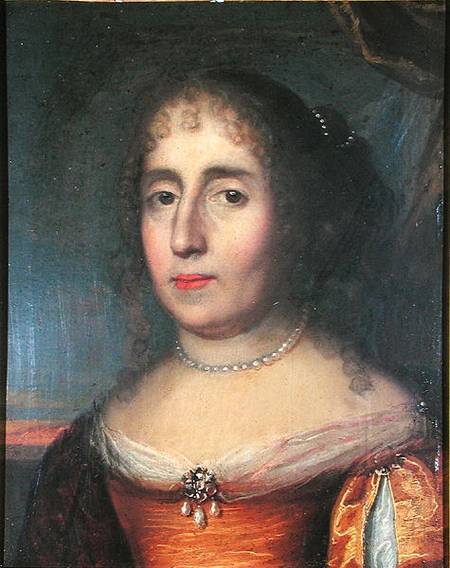
Madeleine de Scudéry, 17th C.
Madeleine de Scudéry (1607-1701) was the most prolific and successful French serially published novelist of heroic epic plots in her time, read throughout Europe and translated into English, German, Italian, and Arabic. She supported herself through her writing, and her efforts earned a pension from Louis XIV. She consistently argued in favor of education for women.[1]
Orphaned at an early age, in the care of her uncle she received an unusually extensive education for a woman. In one of her early works, Les Femmes illustres (1642) or Illustrious Women or Heroic Harangues, Scudéry created fictitious harangues pronounced by powerful and socially prominent women, including Cleopatra and Sappho, that criticized reducing women to silence and the slanders of history, calling for women to express themselves forcefully through spoken and written speech.[2]
She won the first prize for eloquence awarded by the Académie Française (1671), but was barred from membership. Several academicians had attempted to lift the ban against women so that she could join their ranks, to no avail. Although her own authorship was widely acknowledged at the time, she used the name of her brother, Georges de Scudéry, as a pseudonymous signature throughout her career.[3]
She was a charismatic figure in French salon culture. Her salon, le Samedi, which met on Saturdays, became one of the most significant of its time. A number of episodes from her novels had been created earlier in her salon. Readers identified them as re-created events and recognized prominent members from the salon circle. Some accounts relate an incident when a story Scudery was developing with her brother while travelling was overheard, and they were mistakenly suspected of plotting to murder a prince.[4] They were arrested and escorted to Paris for investigation. At some expense and with some difficulty, they were freed with permission for the future to hold an unlimited right and power over all the princes and personages in the legends of fiction.
Works:
Ibrahim or the Illustrious Bassa (1641) was published under her brother’s name.
Illustrious Women or Heroic Harangues (1642) includes ‘The Harangue of Sappho’, about Scudery’s alter ego.
Artaméne or the Grand Cyrus (1649–53), 10 vols; : English title, Artamène or the Grand Cyrus (1649–53).
Clelie a Roman History (1654–60), 10 vols, which included her famous ‘Carte Tendre’ or Arcadian love map and Almahide, or the Slave Queen (1661–3), 8 vols. English title, Clelia (1661).
Célinte (1660)
The Versailles Promenade (1669)
Discours de la gloire (1671)
Conversations Morales (1686)
Entretiens de Morale (1692)
[1] Scudéry, Madeleine de. Selected Letters, Orations and Rhetorical Dialogues. Ed. and trans. Jane Donawerth and Julie Strongson. The Other Voice in Early Modern Europe (Chicago: University of Chicago Press, 2004), 8.
[2] John Conley, “Madeleine de Scudéry,” The Stanford Encyclopedia of Philosophy (Summer 2011 Edition), Edward N. Zalta (ed.), http://plato.stanford.edu/archives/sum2011/entries/madeleine-scudery/.
[3] Joan Dejean. Scudéry, Madeleine de (1608-1701). The New Oxford Companion to Literature in French (Oxford University Press 1995, 2005).
[4] Mary Hays, “Madeliene de Scudery,” Female Biography; or Memoirs of Illustrious and Celebrated Women of all Ages and Countries (6 volumes) (London: R. Phillips, 1803), vol. 6, 388-92, on 390; and Helena Bergmann, “Scudery, Madeliene de,” Mary Hays, Female Biography; or, Memoirs of Illustrious and Celebrated Women, of All Ages and Countries (1803) Chawton House Library Series: Women’s Memoirs, ed. Gina Luria Walker, Memoirs of Women Writers Part II (Pickering & Chatto: London, 2013), vol. 10, 390-94, editorial notes, 630-31, on 630.
Bibliography
Aronson, Nicole. Mademoiselle de Scudéry. Translated by Stuart Aronson. Boston, 1978.
Bergmann, Helena , “Scudery, Madeliene de,” Mary Hays, Female Biography; or, Memoirs of Illustrious and Celebrated Women, of All Ages and Countries (1803) Chawton House Library Series: Women’s Memoirs, ed. Gina Luria Walker, Memoirs of Women Writers Part II (Pickering & Chatto: London, 2013), vol. 10, 390-94, editorial notes, 630-31.
Biographium faemineum. The female worthies; or, Memoirs of the most illustrious ladies, of all ages and nations, who have been eminently distinguished for their magnanimity, learning, genius, virtue, piety, and other excellent endowments … Containing (exclusive of foreigners) the lives of above fourscore British ladies … Collected from history, and the most approved biographers, and brought down to the present time … Imprint London, Printed for S. Crowder, and J. Payne [etc.] 1766.
Burch, Laura Jeanene. Faithful Fictions: Translating Friendship in Works by Marguerite de Navarre, Madeleine de Scudery, and Francoise de Graffigny. [DISSERTATION], University of Minnesota, 2007.
Conley, John, “Madeleine de Scudéry”, The Stanford Encyclopedia of Philosophy (Summer 2011 Edition), Edward N. Zalta (ed.), http://plato.stanford.edu/archives/sum2011/entries/madeleine-scudery/.
Donawerth, Jane. “As Becomes a Rational Woman to Speak.” Listening to Their Voices: The Rhetorical Activities of Historical Women, ed. Molly Meijer Wertheimer. Columbia: University of South Carolina, 1997.
—Rhetorical Theory by Women before 1900. U.S.A.: Rowman & Littlefield Publishers, 2002.
Garnett, Mary Anne. “Madeleine de Scudéry: Les Femmes illustres ou les harangues héroïques (1642).” Writings by Pre-revolutionary French Women, Volume 2, ed. Anne R. Larsen, Colette H. Winn. New York: Garland Publishing, 2000.
Hart, Erica. Cartesian Women: Versions and Subversions of Rational Discourse in the Old Regime. Ithaca: Cornell University Press, 1992.
Hays, Mary. “Madeliene de Scudery.” Female Biography; or, Memoirs of Illustrious and Celebrated Women of all Ages and Countries (6 volumes) London: R. Phillips, 1803, vol. 6, 388-92.
McDougall, Dorothy. Madeleine de Scudéry: Her Romantic Life and Death. London: Methuen & Company, Limited, 1938.
Munro, James S. Mademoiselle de Scudéry and the Carte de Tendre. Durham, U.K., 1986.
Scudéry, Madeleine de. Selected Letters, Orations and Rhetorical Dialogues. Ed. and trans. Jane Donawerth and Julie Strongson. The Other Voice in Early Modern Europe. Chicago: University of Chicago Press, 2004.
–The illustrious ladies of antiquity. Dublin: 1744.
—The Story of Sappho. Ed. and trans. Karen Newman. The Other Voice in Early Modern Europe. Chicago: University of Chicago Press, 2003.
Thicknesse, Ann, 1737-1824. Sketches of the lives and writings of the ladies of France. Addressed to Mrs. Elizabeth Carter. vol. 1. London : printed for W. Brown; and sold by J. Dodsley; E. and C. Dilly; and R. Cruttwell, and T. Shrimpton, in Bath, 1778.
Resources:
Brooklyn Museum
Elizabeth A. Sackler Center for Feminist Art: The Dinner Party: Heritage Floor: Madeleine de Scudéry
https://www.brooklynmuseum.org/eascfa/dinner_party/heritage_floor/madeleine_de_scudery.php
Page citation:
Penelope Whitworth, Penelope. “Madeleine de Scudéry.” Project Continua (January 29, 2014): [date accessed], http://www.projectcontinua.org/madeleine-de-scudery/
Tags: Novelists, Salonnières
